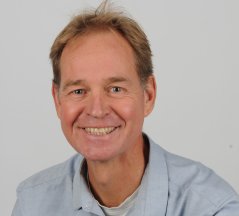
News
Guido van der Werf appointed as Personal Professor of Landscape Fires and Carbon Cycle
The Board of Wageningen University & Research has appointed Prof. Dr. Guido van der Werf as a personal professor in the Meteorology and Air Quality Group. He assumed this role on September 1, 2023.
Van der Werf’s research focuses on the emissions of CO2 and other gases released during forest fires. Thanks to massive amounts of data collected on these emissions, he can increasingly calculate their impact on climate and air quality.
‘In Wageningen, there is an immense wealth of knowledge in the fields of forest management, ecology, forest fire management, remote sensing, and atmospheric processes,’ says Van der Werf. ‘My research on the interactions between climate change and forest fires fits in perfectly here. The connections to experts in various subfields are pleasantly close. I feel like a kid in a candy store. And with all this expertise coming together on campus, the opportunities to impart that knowledge to students will also increase.’
Model for emissions from fires

Worldwide, Van der Werf is among the top experts in Earth sciences since he started a database for gas emissions from forest fires twenty years ago. In addition to CO2, this includes other carbon compounds such as methane and carbon monoxide. Moreover, nitrogen and sulphur compounds, as well as fine particulate matter, are released. Van der Werf used drones flying over Africa and South America to measure smoke plumes. In combination with satellite data and information from past forest fires, he developed a global model called the Global Fire Emissions Database for emissions from forest fires.
With the help of this computer model, Van der Werf studies how fires have increased or decreased over the years and what impact they have on air quality and climate, and vice versa. He also investigates the connection between forest fires and deforestation. For instance, he calculated the annual greenhouse gas emissions resulting from the burning of tropical forests, shedding light on the significance of smouldering peat in places like Indonesia. His research also revealed that burning grasslands in savanna areas constitute a much larger portion of all global fires. However, his research also showed that emissions from these fires are gradually decreasing.
Foundation for climate reports
The Global Fire Emissions Database has been used by hundreds of other researchers, not just for his own research. The model has underpinned much climate research in recent years and has been used in IPCC climate reports.
We demand a lot from our forests. Finding the optimum balance in that is a tremendous challenge, in my opinion
The significant societal value of his research is one of his main motivators to continue delving into forest fires and climate. ‘At this moment, we demand a lot from our forests. They must sequester a considerable amount of carbon, ensure the highest possible biodiversity, and also cope with higher temperatures and longer droughts, which increases the risk of forest fires. Finding the optimum balance in this is a tremendous challenge. The societal dynamics that arise in this context, where the interests of biodiversity and climate sometimes seem to be at odds, are enormously interesting.’
Remote Sensing
Prof. Van der Werf studied hydrology (earth sciences) at VU in Amsterdam. A course on remote sensing sparked his interest, and he went to the United States to conduct research with NASA using these techniques. During this period, Van der Werf began specialising in natural fires. The transition from water to fire was not as significant as it may seem. ‘Knowledge of hydrology is crucial when studying fires.’ After four years of research, he completed his doctoral thesis on the climate effects of forest fires.
In the years that followed, he expanded his model and, consequently, his knowledge of forest fires and climate. His research took him back to the United States and also to Indonesia, South America, and Africa. In 2014, Van der Werf became a university professor at VU Amsterdam, and after nine years, he made the transition to the of Meteorology and Air Quality Group at WUR.